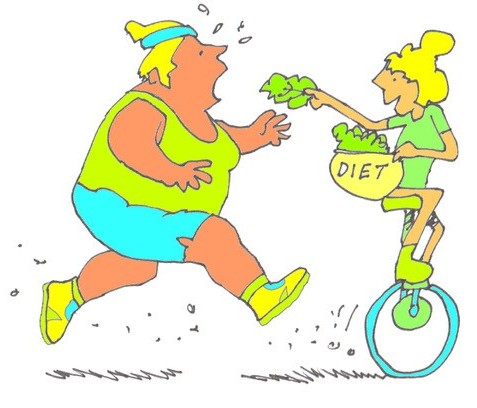Achieving weight loss
Really, really difficult!
As I have said in the previous two blogs, change in our weight is decided by the balance between what we consume in calories of food and what we expend in calories of muscular effort – calories-in vs calories-out. Changing our habitual balance is exceedingly hard. We become accustomed to our eating habit and to our usual patterns of physical activity and can only change either with determined will power.
Why are we getting heavier?
Calories-in
As far as calories-in are concerned, our huge increase in obesity would seem to be explained by the rise in availability of high-calorie foods, particularly sweet, fizzy drinks and the widespread use by the food industry of high-fructose corn syrup. Surprisingly, however, a team of economists from Holloway published a paper in 2016 showing that, judging by the sale of calorific foods, the average daily calorie intake of adults in the UK had actually fallen by 20 per cent over the previous 30 years! They concluded that the rise in obesity was a result of ‘a decline in the strenuousness of work and daily life’. Their figures are supported by the Department for Food, Environment and Rural Affairs (DEFRA), which has shown that overall our calorie intake peaked in the 1970s, declined until the 2000s and has flattened since. More evidence coming to similar conclusions is provided by the food surveys conducted by Public Health England.
This view of the cause of our increasing obesity is not shared by all, however. The Obesity Health Alliance is firmly convinced that the causes are changes in diet, increased portion size, far more meals eaten outside the home and a shift to ready meals, junk food and snacks. The whole problem is made more obtuse by the fact uncovered by the Office of National Statistics that the average Briton consumes 50 per cent more calories than they estimate for themselves – social-desirability bias again!
Calories-out
It is self-evident that we take much less exercise than our forefathers because we just don’t need to. Again it is largely environmental. The development of increasingly sophisticated gadgets and machinery to make living easier means that we no longer need to perform by hand so many tasks of daily living – think hoovers, washing machines, dishwashers, even power tools. Getting around on foot has been replaced by the motor car. Leisure activity has had the effort removed by our devotion to electronic screens. We are protected from concern about this by our social desirability bias again. The average Briton takes between a half to two thirds the amount of exercise that he/she believes.
So what can we do about it?
The most sustainable way of losing weight is to combine less food with more exercise. Much, much easier said than done. The difficulty of reducing calories-in is evidenced by the enormous number of diets out there. Even if they do lead to weight loss it is almost always regained – and I don’t buy the explanation that this is caused by a reduced metabolic rate associated with reduced calorie intake. We become used to our daily input and if it is reduced we become hungry and few of us can resist that for long.
How about exercise? Again increasing activity levels seldom leads to weight loss unless we do an awful lot. It takes much more exercise than we expect to achieve the elusive shedding of pounds/kilos unless we completely change our pattern of behaviour/lifestyle, We tend to take exercise in chunks of perhaps between half an hour and an hour, maybe three to five times a week. This is a small fraction of the week – if we follow the government’s recommendation for 150 minutes per week that amounts to just 0.015 (1.5%) of a total week, completely inadequate to achieve weight loss.
Willpower and dual approach
The most important decider of the ability to lose weight is the determination to do so. You can lose weight by diet alone but you will be hungry and find it hard to sustain. You can lose weight by taking more exercise but that will need to be the equivalent of running 15 miles a week. A mixture of the two is clearly the most sensible approach. Combining dieting and exercise for weight loss means that the process not quite as uncomfortable as either on its own.
Will power can be strengthened by knowing how important it is to lose weight – what is to be gained? For those in the “overweight” bracket (BMI 25-30) the health benefits are relatively small, though it may be important for physical appearance or the ability to fit into those long-remembered clothes at the back of the wardrobe. For the obese the health benefits become much more significant. Look at the problems which accrue, described in last week’s blog.
A plug for exercise
All of this may seem a bit depressing, but there are benefits from just exercising even if it does no’t lead to weight loss. Some of the fat will have been replaced by muscle, and fat people who are measurably fit (quite rare – about 4% of the obese) have a much lower risk of several of the ill effects of obesity.
Subscribe to the blog
Categories
- Accelerometer
- Alzheimer's disease
- Blood pressure
- BMI
- Cancer
- Complications
- Coronary disease
- Cycling
- Dementia
- Diabetes
- Events
- Evidence
- Exercise promotion
- Frailty
- Healthspan
- Hearty News
- Hypertension
- Ill effects
- Infections
- Lifespan
- Lipids
- Lung disease
- Mental health
- Mental health
- Muscles
- Obesity
- Osteoporosis
- Oxygen uptake
- Parkinson's Disease
- Physical activity
- Physical fitness
- Pregnancy
- Running
- Sedentary behaviour
- Strength training
- Stroke
- Uncategorized
- Walking


